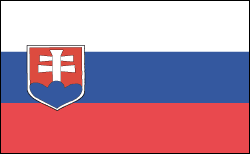Slovakia History


Slovakia Becomes an Independent Republic and Eventually Joins the EU and NATO
After the general election in June 1992, it was decided that two fully independent republics would be created. The Republic of Slovakia came into existence on Jan. 1, 1993. The parliament in February elected Michal Kovac as president.
Populist Vladimir Meciar, who served three times as Slovakia's prime minister, exhibited increasingly authoritarian behavior and was cited as the reason Slovakia was for a time eliminated from consideration for both the EU and NATO. Slovakia's very low influx of foreign capital during Meciar's tenure was the result of his government's lack of transparency. Meciar was unseated in 1998 elections by the reformist government of Mikulás Dzurinda. In April 2000 Meciar was arrested and charged with paying illegal bonuses to his cabinet ministers while in office. A three-week standoff with police preceded the arrest, ending only when police commandos blew open the door on Meciar's house and seized him. He was also questioned about his alleged involvement in the 1995 kidnapping of the son of Slovakia's former president, Michal Kovac.
Dzurinda has improved Slovakia's reputation in the West, but his tough economic measures have made him unpopular within the country. Former prime minister Meciar has proven oddly resilient. In Sept. 2002 elections, the ruling coalition held onto power, despite Meciar coming out ahead in the vote. In April 2004, Meciar ran for the presidency against his former right-hand man, Ivan Gasparovic. Gasparovic, however, won the largely ceremonial post by a wide majority. In 2004, Slovakia joined the EU and NATO. In May 2005, it ratified the EU constitution.
Robert Fico of the Socialist Party became prime minister in July 2006, after forming an odd coalition with two right-wing nationalist parties, including Meciar's.
In April 2009, incumbent Ivan Gasparovic won the presidential elections with 46.7% of the vote. Parliamentary elections in July 2010 were inconclusive. Iveta Radicova, a former MP and presidential candidate in 2009, became prime minister, heading a four-party coalition government. The coalition includes her conservative Slovakian Democratic and Christian Union, the liberal Freedom and Solidarity Party, the largely Hungarian Most-Hid, and the Christian Democrat Movement.







